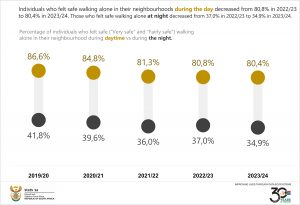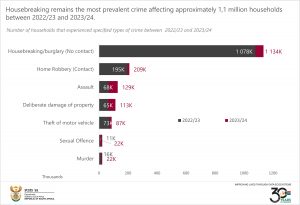SA Citizens Fear Walking Alone
Statistics South Africa’s Governance, Public Safety, and Justice Survey (GPSJS) 2023/24 reveals a decline in the sense of safety among individuals walking in their neighbourhoods during the day and at night since 2019/20. Respondents were asked how safe they felt walking in their neighbourhoods alone during the day and when it was dark. The sense of safety in the dark among individuals aged 16 and older has declined, dropping from 41,8% in 2019/20 to 34,9% in 2023/24. This trend is particularly pronounced among females, who reported feeling less safe walking in their neighbourhoods after dark compared to males. Additionally, the percentage of people who feel safe walking alone during the day fell from 86,6% in 2019/20 to 84,8% in 2020/21, continuing to decline throughout the reporting period and reaching 80,4% in 2023/24.
In a broader context, about 40% of individuals aged 16 and older have taken steps to protect themselves from crime, with 33,4% opting to walk only during safer hours to minimise their risk.
Walking alone can be a source of independence and tranquillity, but for many it also brings a heightened sense of vulnerability due to the prevalent fear of crime. The anxiety that accompanies walking alone reflects the real and perceived threats that individuals may face. This fear can have a profound impact on how people navigate public spaces, influencing their behaviour, sense of freedom, and overall well-being.
According to the latest report, household crimes in South Africa increased in the 2023/24 period as compared to the previous year.
The data reveals that housebreaking remains the most prevalent crime affecting households, with approximately 1,1 million households experiencing such incidents. This translates to an estimated 1,5 million incidents of housebreaking, affecting 5,9% of all households in the country. Notably, the rate of housebreaking reports to the police dropped by 7,3 percentage points during the same period. The GPSJS also highlighted that male-headed households and
those in metropolitan areas were more likely to be targeted, with incidents peaking in June, September, and December.
Home robbery ranks as the second most common crime affecting South African households, with 209 000 households impacted in the 2023/24 period. An estimated 263 000 incidents were reported, accounting for 1,1% of all households nationwide. Approximately 58% of households that experienced a home robbery reported the crime to the police. In most cases, a gun was used as the primary weapon during the robberies. However, only 7,4% of victims received counselling after the incident.
Theft of personal property remains the most frequently reported crime among individuals aged 16 and older, followed by street robbery and consumer fraud. Approximately 1,3 million individuals reported experiencing theft of personal property, with a total of 1,4 million incidents occurring, peaking in April and December. Males and residents of metropolitan areas were the most likely to be victims of this crime. Notably, only 28,5% of those affected reported the incidents to the police, with individuals aged 16 to 34 experiencing a higher rate of victimization compared to other age groups.
Assault incidents among individuals aged 16 and older have also risen, increasing from 263 000 in 2022/23 to 295 000 in 2023/24. Victims of assault indicated that knives were predominantly used in these incidents, with nearly 73% resulting in injuries. Only about 2% of assault victims sought counselling afterward. Most perpetrators were known to their victims, including friends or acquaintances (24,7%), spouses or intimate partners (12,6%), and relatives or other household members (8,9%).
The GPSJS also addresses a range of other crimes, including motor vehicle hijacking, deliberate damage to dwellings, murder, sexual offenses, consumer fraud, psychological violence, and public perceptions of safety and the effectiveness of police and judicial systems.
For more information on these topics and crime in SA, download the Governance, Public Safety, and Justice Survey (GPSJS) 2023/24 here.



